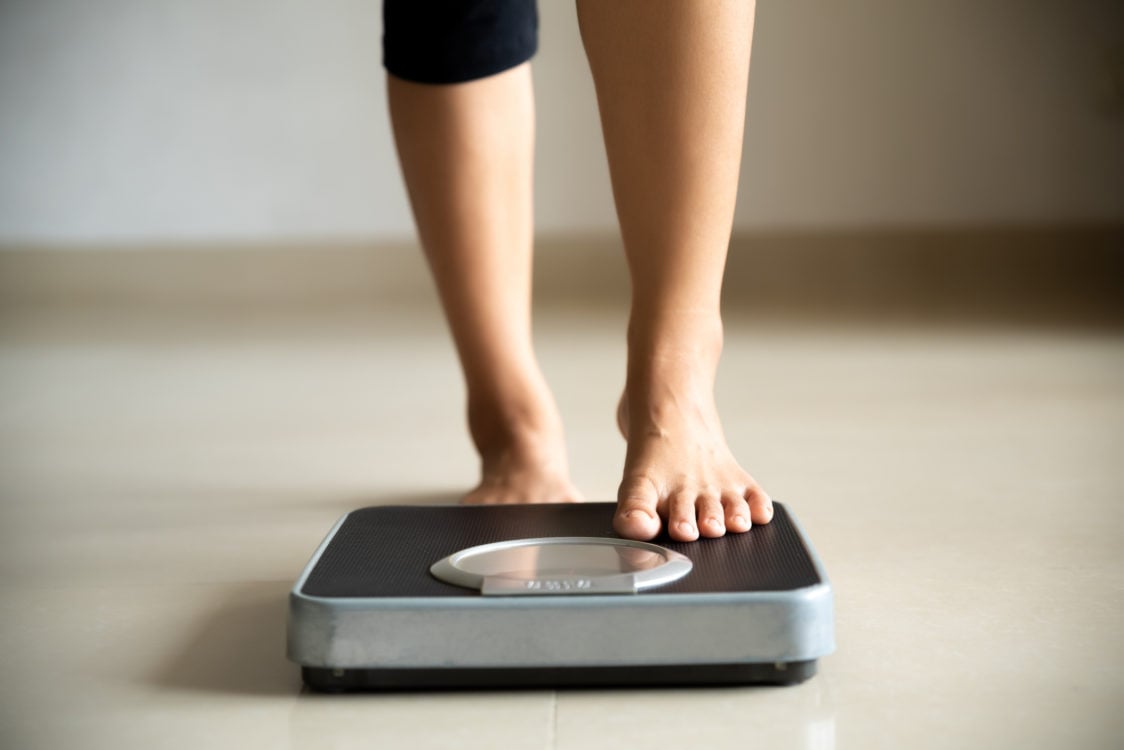Table of Contents
Overweight and obesity are one of the world’s biggest problems. The statistics of the World Health Organization are alarming. In 2016, 1.9 billion adults were overweight, of which 650 million were obese. In less than 50 years, the occurrence of obesity has almost tripled worldwide.
Other similarly unflattering statistics for overweight and obesity can be found also among children and teenagers. Four years ago, 340 million of them were registered as overweight or obese worldwide, representing about 18% of the world’s population in this age group. It is said that gaining weight is way easier than losing weight. In today’s article, we will show you the main reasons why we gain weight, and we will also talk about some essential advice and tips on how to lose the extra kilos. [1-2]

Characteristics of overweight and obesity
Overweight can simply be characterized as the stage before obesity. In other words, it is a weight that is calculated to be higher than the “standard” with regard to height. Obesity is a higher stage of overweight and is defined as an abnormal or excessive accumulation of fat that can worsen our health. Obesity is a more complex health problem and at the same time a chronic disease that is a risk factor for diabetes, high blood pressure, but also cardiovascular diseases such as heart disease or gallstones. [3-4]
Overweight and obesity can increase the risk of some health problems and could be associated with certain social and mental problems. Obese people may suffer from depression, reduced self-esteem, but also have occasional health problems. The most serious health risks associated with overweight, but especially obesity, include in particular:
- type 2 diabetes
- high blood pressure
- ischemic heart disease (caused by a reduction or complete cessation of oxygen and nutrient supply to the heart muscle)
- high LDL cholesterol, low HDL cholesterol or high triglycerides
- stroke
- gallbladder disease
- osteoarthritis
- sleep apnea (sleep disorder when your breathing stops regularly) [5]
The World Health Organization recommends the use of the Body Mass Index (BMI) for the classification of overweight and obesity.
What is BMI?
The Body Mass Index is a method of determining the health risk of obesity, considering a person’s body weight and height. It is an indirect form of fat measurement and one of the ways you can check and calculate if your weight is alright. The result of the measurement is a number that will classify you into one of the BMI categories according to the state of your weight.
Interestingly, average BMI values vary for different races and countries. Asians have different average BMI values than Europeans, and while in most African countries, for example, the average is from 20 to 22.9, in most European countries it is between 25 and 26.9, which is already a general degree of overweight. BMI applies to the average adult and does not apply to children, teenagers under 18, pregnant women, and athletes. Everything that is important to know about BMI, along with instructions on how to calculate your own values, can be found in the article What is a BMI calculator and is it reliable at all? [6-7]
Energy intake and expenditure
Energy intake
Regular energy intake from food is essential for life. We need it for various processes, which include mainly maintaining the basic bodily functions necessary for life, muscle growth, or the functioning of individual organs. However, daily energy consumption varies greatly from person to person. This is caused by factors such as age, gender, height, body weight, but also, for example, lifestyle or work intensity.

We obtain energy from the food and beverages we consume by oxidizing macronutrients – carbohydrates, fats, proteins, but also alcohol. However, the amount of energy that each of these macronutrients provides varies:
- Fats – 9 kcal (37 kJ) / g
- Proteins – 4 kcal (17 kJ) / g
- Carbohydrates – 4 kcal (17 kJ) / g
- Alcohol – 7 kcal (29 kJ) / g
This means that alcohol has almost twice the energy value and does not contain any nutrients compared to proteins. Studies have confirmed that alcohol consumption can make a significant contribution to weight gain in both adults and young people.
The ideal daily calorie intake varies mainly depending on age, gender, amount of active body mass, but also the level of physical activity, lifestyle, and difficulty of physical work. According to the European Food Safety Authority (EFSA), the recommended daily intake is 2,000 calories for an average woman and 2,500 for an average man. However, the value may vary according to the factors we have mentioned above. [8-10]
You might be interested in these products:
Energy expenditure
1 Basal metabolic rate (BMR)
In order for our body to maintain its basic vital functions, we need to burn a certain number of calories, the value of which is expressed by the basal metabolic rate. Compared to the total daily energy expenditure, it represents about 60 to 75%. The body uses this energy only to maintain vitally important organs and for basic activities such as breathing, blood circulation, nutrient processing, and cell production. Age, weight, and sex are the decisive factors when calculating the basal metabolic rate. If you would like to calculate your basal metabolism and learn more about it, read our article What is basal metabolism and how to calculate BMR? [11]
2 Physical activity level (PAL)
If we just lazed around laying on the coach all day and did nothing at all, our necessary energy intake would be somewhere around the resting metabolism. However, an average person needs to receive a little more energy for all daily activities.
Its amount differs based on our lifestyle and the intensity of our daily activities, which is expressed by the coefficient PAL (physical activity level). The variance of this coefficient can be quite significant, from a sedentary lifestyle with a minimum of movement to a very active and demanding job. Do you want to know the detailed division of the PAL coefficient and how to calculate your total daily energy intake? You can find everything in the article How to calculate energy and macronutrient intake for weight loss or muscle gain?
In order to maintain an optimal weight and not gain weight, there is a general rule that we should take about as many calories as we spend during the day. So why do we gain weight?
7 most frequent reasons why we gain weight
1. Genetics
Surely you have already heard sentences like “I can eat everything, and I will not gain a gram”, or the opposite case – “I gain weight just by breathing”. Genetics may play a certain role in overweight or obesity, but not as significant as is often claimed in our society. Genetic defects, which are directly linked to obesity, play a role in less than 1% of the population.

According to the prestigious Harvard University, the probability that two obese parents will raise an obese child is up to 80%. However, this does not necessarily mean that genetics is to blame. It should not be forgotten that the child is led by his parents to certain lifestyle habits and lifestyle itself. We can assume that their evaluation was also based on the results of their research, which they carried out on several identical twins. They were fed the same rations of food for three months, and the difference in weight gain was quite significant, from four to thirteen kilos. However, their results may have been distorted by the twins’ dietary history, and thus as they were fed before the research, their overall upbringing, and also the intestinal microbiome. This simply means that even when two people eat the same food, they do not have to absorb (take) the same energy. [12]
Signals that a person has a genetic predisposition to obesity:
- the person was overweight for most of his/her life
- one or both parents, along with some relatives, are significantly overweight
- he/she cannot lose weight even with increased physical activity and reduced calorie intake
However, this does not mean that we should accept obesity if we have a genetic predisposition. The quality of food can fundamentally affect which genes are expressed in the human body and which are not. At the same time, we should set the energy intake correctly with regard to our current needs and amount of exercise and get enough sleep. [12-13]
2. Industrially processed foods
You may have already seen a few videos of a hamburger that even after a week of “resting” in your refrigerator looks fresh. Consumption of industrially processed foods in society is growing, although they contain no or only a small amount of nutrients, vitamins, minerals, and enzymes. These are highly industrially processed foods that normally contain sugar, fat, salt, or a combination of all of them. It is estimated that up to 20% of people may be dependent upon such foods. And this number may be even higher in obese people. Such foods include, for example, chicken nuggets, chips, and the burgers we have already mentioned. [14] [27]
3. Addiction to food and sugar
Mainly sweetened foods high in fat and salt can stimulate the nerve centers in our brain. In contrast to minimally processed and healthy foods, such as cereals or rice, the consumption of refined sugars releases dopamine in the striatum, a part of the brain considered the center of rewards. These types of foods are therefore often compared to common drugs such as alcohol, nicotine, or cocaine. However, sugar addiction, both mentally and physiologically, is not as strong as addiction to drugs. It should be added that there is still a lack of studies carried out on humans to definitively confirm the premise of human sugar addiction. [15]
4. Lack of physical activity
Stanford University has conducted long-term research, the results of which have shown that regular physical activity can help with weight loss more than diet. These assumptions are based on the fact that the percentage of women who did no physical activity increased up to 33% in more than 10 years, while it was similar in the case of men. However, decreased physical activity does not reduce energy intake. [16]
5. Taking medication
Several pharmaceutical drugs can cause weight gain as a side effect. These medicaments include birth control pills, corticosteroids, drugs to treat bipolar disorder, schizophrenia, or depression, as well as some drugs to treat diabetes. [17]
6. Aging
Probably not new to you is the information that human metabolism slows down with age. This is starting to happen slightly even after the age of 20 when metabolism slows down to two percent in one decade. The slowdown in metabolism is mainly caused by hormonal changes in the body and loss of muscle mass. After the age of 30, we lose an average of three to five percent of muscle mass in ten years. However, it is possible to fight this with an active lifestyle and strength training. [18]
7. Stress
When we are stressed out, the hormone cortisol is released into our body, which leads to an increase in blood pressure, as well as blood sugar levels. In addition, long-term increased cortisol levels have been shown to store visceral fat (fat that is stored between organs in the abdomen).
In this case, stressors also play an important role. These are phenomena, situations, or memories that cause us nervousness and fear, especially in the case of long-term stress, or even increased heart beating, rapid breathing, and dry mouth. Several types of stressors can be risk factors for obesity, and in the long term, cumulative exposure to these stressors can increase the likelihood of obesity. [19-20]
In some cases, impaired health may also be responsible for unwanted weight, especially untreated hypothyroidism (decreased thyroid function), diabetes and its treatment, or Cushing’s syndrome (a disorder caused by high levels of cortisol in the blood). [14]
How to lose the extra kilos?
If you do not have any health restrictions that could prevent you from losing weight and achieving a better body shape, try ways to lose weight safely. According to experts, weight loss up to 1 kg per week is recommended as the most effective and sustainable in the long run.
Many people give up after a few days because a sudden change in them suddenly causes a feeling of hunger and discomfort. Of course, it will always depend mainly on you, but it’s worth trying one of the following ways…
8 tips to lose weight
1. Reduce calorie intake
When you change your diet and your daily energy intake decreases, especially during the first few days and weeks, you should notice some weight loss. Ideally, it is recommended to reduce caloric intake by about 15-20%. But keep in mind that later this process will slow down because when you lose weight, water, fat, and lean tissue will leave your body, which will slow down your metabolism. However, you can fight the loss of lean tissue with strength training.

2. Remove refined carbohydrates from your diet
Carbohydrates are monosaccharide units linked to each other. Their number depends on the type of carbohydrate; monosaccharide, disaccharide, polysaccharide, etc. Complex carbohydrates (whole grains, rice, legumes) are significantly better for the body compared to refined ones, such as white flour or sugar. Refined carbohydrates are technologically processed, that is why they lose a substantial part of fiber, vitamins, and minerals. Therefore, they have a significantly lower nutritional value, they digest faster, and we do not feel so full after consuming them compared to complex carbohydrates. Refined carbohydrates in the form of sugar lose their nutritional value due to a chemical process in which molasses is excreted from them – a source of important vitamins and minerals such as calcium, iron, sodium, or potassium.
3. Eat breakfast (whenever you wish)
If you have a regular schedule and you wake up at about the same time each morning, a healthy breakfast can help you concentrate better and help you handle your work or school. Your body is most sensitive to insulin in the morning, so foods rich in protein and fiber are especially recommended. It will satiate you enough and can help lower cholesterol levels. It should also be added that the first meal of the day within an hour of waking up may not suit everyone.
4. Get enough sleep
Lack of sleep can affect the regulation of two important hormones in the body, leptin, and ghrelin. These neurotransmitters are thought to be central to appetite. While ghrelin promotes hunger, leptin contributes to the feeling of satiety, and it is a lack of sleep that increases the level of ghrelin, while it reduces the level of leptin. It is generally recommended to get at least 7-9 hours of sleep.
5. Drink more water
Yes, even such a seemingly basic thing can help you lose weight more effectively. Drinking water can help you:
- naturally suppress your appetite
- ensure the optimal functioning of all biochemical processes of the body
- reduce total caloric fluid intake
- contribute to the natural detoxification of the body
6. Eat more complex carbohydrates
When you eat foods rich in carbohydrates, your body releases insulin to help glucose get from your blood to your cells. At the same time, however, increased insulin levels prevent the release of fats, as its priority is to burn glucose. Excess glucose, which the body cannot cope with, is first stored as a supply of muscle and liver glycogen and later again in the form of fats. Therefore, if you focus on consuming enough complex carbohydrates, which are absorbed more slowly into the body due to fiber, you will prevent a sharp rise in glycemia and insulin. Normally, it is recommended to take 40-65% of complex carbohydrates from the total energy intake.
7. Give preference to healthy fats
The idea that you can easily lose weight by keeping fats to a minimum is wrong. Dietary fats are essential for boosting immunity. In addition, omega 3 fatty acids help improve brain function, and adequate fat intake contributes to the production of important hormones. Reach for the unsaturated fats contained in avocados, fish, or nuts and seeds. Alternatively, you can try healthy fats in the form of nutritional supplements. But keep in mind what we have mentioned above; fats contain the most energy of all nutrients.
8. Move and exercise
What about trying aerobic exercise, one of the most popular types of weight loss exercises? Cardio exercises include walking, running, but also cycling, and swimming. You don’t have to start running half marathons or cycling hundreds of kilometers. When you start moving and exercising, you will burn (the extra) calories, while visibly reducing the risk of internal abdominal (visceral) fat, which increases the risk of type 2 diabetes and heart disease. You can read more about why to start, for example, running in our article 11 reasons to start running. How will it change your body? [21-26]

What should you remember?
Overweight and obesity are one of the biggest problems in the world, and as we have seen, gaining weight can be caused by several factors. Some we can influence more, others less. Anyway, we can always do something for ourselves to help weight loss and feel better and more satisfied at the end of the day. And it doesn’t matter if we have 75 kg and a sedentary job or our weight is almost 100 kilos, also because of the never-ending sugar cravings. To begin with, all you have to do is move more, and secondly, you should replace the sweets with something healthier and more nutritious.
Have you ever tried to lose weight? What helped you the most? Share your experiences with us, and if you have found out something new while reading these lines, share the article with your friends. Maybe one of them wants to lose weight but does not know how.
[1] World Health Organization - Obesity and Overweight – https://www.who.int/news-room/fact-sheets/detail/obesity-and-overweight
[2] NCD Risk Factor Collaboration - Worldwide trends in body-mass index, underweight, overweight, and obesity from 1975 to 2016: a pooled analysis of 2416 population-based measurement studies in 128·9 million children, adolescents, and adults – https://www.ncbi.nlm.nih.gov/pmc/articles/PMC5735219/
[3] Rethink Obesity - Obesity Is a Disease – https://www.rethinkobesity.global/
[4] Centers for Disease Control and Prevention - Defining Adult Overweight and Obesity – https://www.cdc.gov/obesity/adult/defining.html
[5] National Institute of Diabetes and Digestive and Kidney Diseases - Health Risks of Overweight & Obesity – https://lnk.sk/ut24
[6] Marengo K. - BMI calculators and charts – https://www.medicalnewstoday.com/articles/323586
[7] IndexMundi Blog - Weight of the World – https://www.indexmundi.com/blog/index.php/2013/04/11/body-mass-index-bmi-by-country/
[8] Shelton N. J., Knott C. S. - Association Between Alcohol Calorie Intake and Overweight and Obesity in English Adults – https://www.ncbi.nlm.nih.gov/pmc/articles/PMC4025698/
[9] Battista K., Scott L. - Estimating how extra calories from alcohol consumption are likely an overlooked contributor to youth obesity – https://www.ncbi.nlm.nih.gov/pmc/articles/PMC5650014/
[10] NHS - What should my daily intake of calories be? – https://www.nhs.uk/common-health-questions/food-and-diet/what-should-my-daily-intake-of-calories-be/
[11] Frothingham S. - What Is Basal Metabolic Rate? – https://www.healthline.com/health/what-is-basal-metabolic-rate
[12] Harvard Health Publishing - Why people become overweight – https://www.health.harvard.edu/staying-healthy/why-people-become-overweight
[13] Bouchard C., and col. - The response to long-term overfeeding in identical twins – https://pubmed.ncbi.nlm.nih.gov/2336074/
[14] Gunnars K. - 10 Leading Causes of Weight Gain and Obesity – https://www.healthline.com/nutrition/10-causes-of-weight-gain#TOC_TITLE_HDR_4
[15] Avena N. M., Rada P., Hoebel B. G. - Evidence for sugar addiction: Behavioral and neurochemical effects of intermittent, excessive sugar intake – https://www.ncbi.nlm.nih.gov/pmc/articles/PMC2235907/
[16] Stanford Medicine - Lack of exercise, not diet, linked to rise in obesity, Stanford research shows – https://med.stanford.edu/news/all-news/2014/07/lack-of-exercise--not-diet--linked-to-rise-in-obesity--stanford-.html
[17] Medline Plus - Weight gain – unintentional – https://medlineplus.gov/ency/article/003084.htm
[18] Fetters K. A. - How Much Does Your Metabolism Really Slow Over the Years? – https://health.usnews.com/wellness/articles/2016-09-23/how-much-does-your-metabolism-really-slow-over-the-years
[19] Epel, E. S., and col. - Stress and body shape: stress-induced cortisol secretion is consistently greater among women with central fat – https://pubmed.ncbi.nlm.nih.gov/11020091/
[20] Cuevas A. G., and col. - Psychosocial Stress and Overweight and Obesity: Findings From the Chicago Community Adult Health Study – https://academic.oup.com/abm/article-abstract/53/11/NP/5420932?redirectedFrom=fulltext
[21] HelpGuide - How to Lose Weight and Keep It Off – https://www.helpguide.org/articles/diets/how-to-lose-weight-and-keep-it-off.htm
[22] Cherney K. - Simple Carbohydrates vs. Complex Carbohydrates – https://www.healthline.com/health/food-nutrition/simple-carbohydrates-complex-carbohydrates
[23] Cleveland Clinic - Do You Really Need to Eat Breakfast? – https://health.clevelandclinic.org/do-you-really-need-to-eat-breakfast/
[24] SleepFoundation.org - Weight Loss and Sleep – https://www.sleepfoundation.org/physical-health/weight-loss-and-sleep
[25] John Hopkins University - Yes, drinking more water may help you lose weight – https://hub.jhu.edu/at-work/2020/01/15/focus-on-wellness-drinking-more-water/
[26] Ismail I., and. col. - A systematic review and meta-analysis of the effect of aerobic vs. resistance exercise training on visceral fat – https://pubmed.ncbi.nlm.nih.gov/21951360/
[27] Pursey K. M., and col. - The prevalence of food addiction as assessed by the Yale Food Addiction Scale: a systematic review – https://pubmed.ncbi.nlm.nih.gov/25338274/


Add a comment